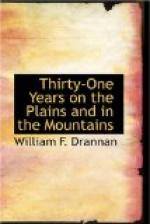This conversation caused a great deal of talk of a court-martial, but it all blew over, I suppose, on account of Captain Jack murdering Gen. Canby. The next conversation I had with Gen. Wheaton, I asked why the picket guard let those Indians pass through the picket line, and speaking as though I thought they had passed boldly out through the line; he said:
“I cannot see into it myself.”
I said: “General, that is the way the Indians will all get out of there, and at the final surrender you will not have six warriors in the cave. From this on you will find that they will gradually desert Jack, for the squaws told me that they were getting very hungry.”
It was reported around that Captain Jack and three other Indians would be hung if caught alive, this being the orders from headquarters. The other three were Schonchin, Scarfaced Charlie and Shacknasty Jim, these being Jack’s council or under chiefs.
When this report came, Gen. Wheaton told me that if it was necessary he would make another detail of scouts, for he would not under any consideration have the Indians escape. I told the General to give himself no uneasiness in regard to that part of it, for we would run down all the Indians that crossed the picket line, but I must know what I should promise a prisoner when I captured him. I asked if I should promise them protection or not, for if there was no protection, I would not bring them in. He assured me that all prisoners caught after this would be protected as prisoners of war until tried and proven guilty.
What the General meant by that was those who might be proven guilty of being directly interested in the murder of Gen. Canby and Col. Thomas.
I now put George Jones on the night shift. He had the entire charge of night scouting, and he and his assistants rode all night long. In the morning I started out with my assistants and rode all day; so it was impossible for the Indians to get out and away without our getting track of them, and if they left a track we were sure to capture them.
We kept this up for about three weeks, when I made a change; George and I doing the night scouting alone, and leaving the day scouting for the other scouts.
One night we were out near Dry Lake, about five miles from headquarters, and there came up a cold fog. We built a little fire to warm by, and shortly after we had started it we heard what an inexperienced man would have called two cayotes, but we knew they were Indians and were in different directions and this was their signal for meeting.




